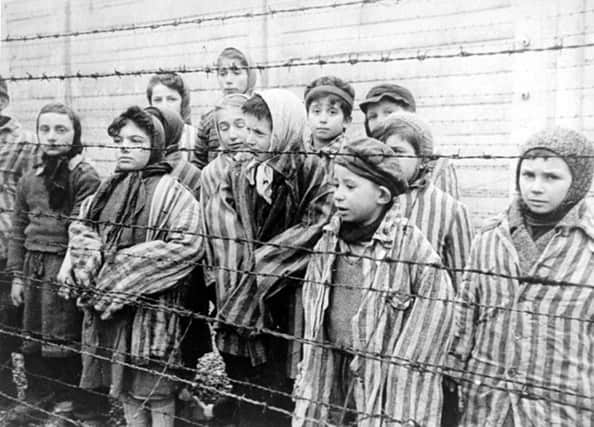Holocaust victims rememberedwhile genocide goes on worldwide


The 27th of January 1945 was the day that Auschwitz-Birkenau in German-occupied Poland was liberated, bringing to an end the biggest mass murder in a single location in human history.
Over the past weeks Roamer’s page has shared a number of accounts of, and reflections about, Hitler’s terrible genocide.
Advertisement
Hide AdAdvertisement
Hide AdOn Tuesday night I attended just one of the host of recent, local, memorial events, held by the Killeeshil and Clonaneese Historical Society in the Killymaddy Centre on the Ballygawley Road from Dungannon.
It was both inspiring and humbling to be part of a sad yet positive occasion, where folk travelled through the cold wind and darkness to gather in quiet, country venue - to think about, to discuss and to remember one of history’s darkest eras.
The Holocaust Memorial Day Trust (HMDT) is the charity which promotes, supports, encourages and inspires individuals and organisations across the U.K. to “play their part in learning lessons from the past and so create a safer, better future.”
Annually, on and around 27 January, the organisation invites us “to pause to remember the millions of people who have been murdered or whose lives have been changed beyond recognition during Nazi mass-murder and persecution and in subsequent genocides in Cambodia, Rwanda, Bosnia and Darfur.”
Advertisement
Hide AdAdvertisement
Hide AdWe are invited by HMDT to “honour the survivors of these regimes and challenge ourselves to use the lessons of their experience to inform our lives today.”
Before, during and after Memorial Day we can seek to learn the lessons of the past “and recognise that genocide does not just take place on its own, it’s a steady process which can begin if discrimination, racism and hatred are not checked and prevented.”
“We’re fortunate here in the UK,” HMDT tells us - “we are not at risk of genocide. However, discrimination has not ended, nor has the use of the language of hatred or exclusion. There is still much to do to create a safer future.”
The on-going programme of Holocaust Memorial events around Northern Ireland includes an enormous variety of different ways that local people are marking history’s long and continuing tally of genocide.
Advertisement
Hide AdAdvertisement
Hide AdRoamer’s page today is by no means a definitive list of commemorations on offer - that’s available on HMDT’s packed website at hmd.org.uk - but mentioning even a few of today’s and next week’s local events reveals the absolutely intriguing breadth of observation.
Until 31 January there’s an entrance-free exhibition in Belfast’s Linen Hall Library entitled ‘Representations of Jews in Irish Literature’.
The library has already held several special commemorative events, and this exhibition is a portrayal of Jewishness in Ireland through a selection of key Irish-Jewish writing and Irish literature.
Including the medieval Annals of Inisfallen, through centuries of poetry, prose and drama, up to the present day, the Linen Hall exhibition looks at the relationship between Jews and Ireland, as it’s found in literature.
Advertisement
Hide AdAdvertisement
Hide AdBelfast’s Northern Ireland War Memorial is commemorating Holocaust Memorial Day with a display of Holocaust-inspired paintings by local artist Leslie Nicholl, and a primary school is visiting the museum to take part in a special remembrance activity based on the story of the Millisle farm.
Between 1938, when the first Jewish adults and children arrived on Millisle Farm, until its closure in 1948 the farm was home to well over 300 people.
In the War Memorial gallery, as well as learning about the Holocaust, schoolchildren can “plant an individual bean sprout in memory of a child who found refuge on the farm during WWII.”
Tonight Roamer is attending a special commemorative event organised by Ards and North Down Council held in Bangor Town Hall and at the same time there are talks by Peter Osborne ‘Remembering Srebrenica’, and by international documentary photographer James Hughes, in Ballymena’s Braid Centre.
Advertisement
Hide AdAdvertisement
Hide AdHosted by the Ballymena Inter-Ethnic forum and Mid and East Antrim Borough Council, Peter will be speaking about lessons from the genocide in Srebrenica and the challenges of reconciliation in a divided society.
James Hughes will be presenting images that he has photographed from concentration/death camps in Sachsenhausen, Germany, Terezin in the Czech Republic, Breendonk in Belgium and the S-21/ Killing fields in Cambodia.
Tonight at 7.30 there’s a screening of Sophie’s Choice organised by Antrim and Newtownabbey Council in Newtownabbey’s Old Courthouse.
The film is based on a novel by American author William Styron, about the relationships between three people sharing a boarding house in Brooklyn: Stingo, a young aspiring writer from who befriends the Jewish Nathan Landau and his lover Sophie, a Polish, Catholic survivor of the German Nazi concentration camps.
Advertisement
Hide AdAdvertisement
Hide AdThe plot ultimately centres on a tragic decision that Sophie was forced to make on her entry, with her children, into Auschwitz.
All across Ulster, today and over the next few days and weeks, there are church services, talks, genocide-survivors’ accounts, exhibitions and commemorations.
And it’s not all history!
In many parts of the world today all of the unimaginable horrors of mankind’s on-going holocausts are continuing.
Visit hmd.org.uk for more information and details of local commemorative events.